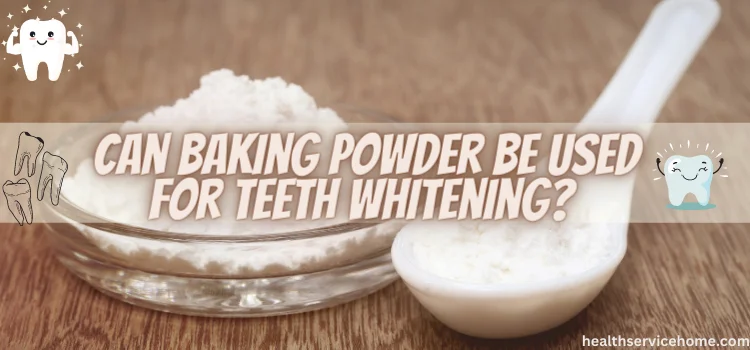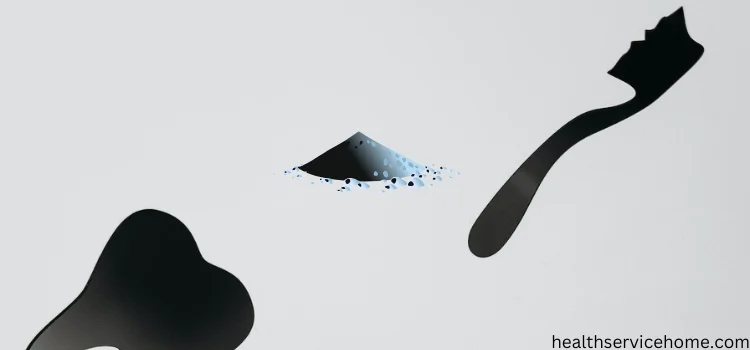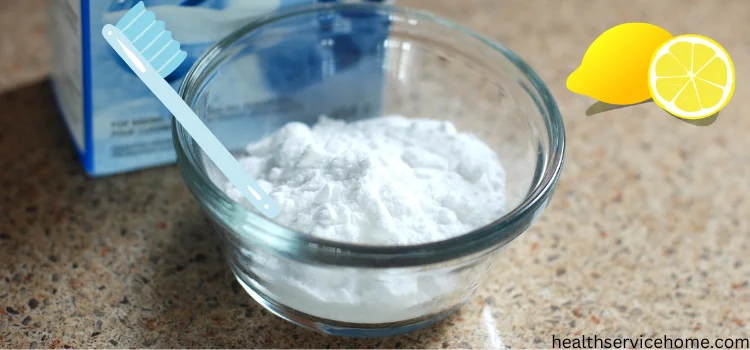It’s no secret that everyone wants a bright, shiny, and healthy smile. But with the numerous teeth whitening solutions available, knowing the most effective and safest choice can take time.
One home remedy that has gained popularity over the years is baking powder. But can baking powder be used for teeth whitening? Let’s find out.
The Short Answer is: Baking powder is not recommended for teeth whitening. While it’s often confused with baking soda, baking powder is not the same and doesn’t have the same teeth-whitening benefits.
Baking soda, with its mild abrasive properties, can help remove surface stains on teeth, but baking powder lacks sufficient evidence to support its use in teeth whitening.
Table Of Contents.
Benefits Of Baking Powder On Teeth.
The most sought-after benefit of baking soda is its teeth-whitening abilities. It’s a mild abrasive, meaning it can help scrub away surface stains on teeth.
Furthermore, it’s alkaline and salty, which helps lighten acid-based food and drink stains like coffee, tea, and red wine.
1. Removes Plaque.
Baking soda also excels at removing plaque due to its abrasive nature. It can scrub the sticky bacterial buildup when used correctly, resulting in cleaner, healthier teeth and gums.
2. Freshens Breath.
Baking soda can also help freshen your breath. It neutralizes the odors, not just masks them, thus providing a longer-lasting fresh breath.
3. Prevents Tooth Decay and Gum Disease.
As baking soda neutralizes harmful acids in the mouth, it helps prevent tooth decay and gum disease.
4. Affordable and Accessible.
Lastly, baking soda is readily available in most kitchens, making it a cost-effective alternative to commercial dental products.
Baking Soda For Teeth Side Effects.
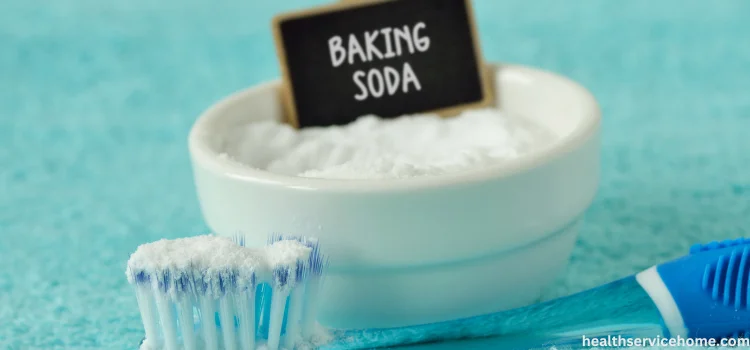
While baking soda has numerous benefits, it also has potential side effects. If not appropriately used, baking soda can cause harm to your dental health.
1. Enamel Erosion.
Baking soda is abrasive, and while this helps to remove stains, it can also wear away your enamel if used too frequently or in too high a concentration. Sensitivity can be caused by erosion of the enamel.
2. Not for Long-Term Use.
While it may help whiten teeth, baking soda shouldn’t replace your regular toothpaste as it doesn’t contain fluoride, which is essential for preventing tooth decay and promoting tooth remineralization.
3. Can Cause Gum Irritation.
Some people may experience gum irritation or a burning sensation due to baking soda’s alkalinity. It’s always best to consult your dentist before starting a baking soda regimen for your teeth.
4. Not Suited for Everyone.
People with braces, permanent retainers, or other dental appliances should avoid baking soda as it may soften the adhesive.
5. Alters Oral pH.
Regular use of baking soda can upset the oral pH balance, which can lead to potential problems like bad breath or a metallic taste.
How Fast Does Baking Soda Whiten Teeth?
The speed at which baking soda will whiten your teeth can vary based on several factors, such as the natural color of your teeth, the types of stains on your teeth, and how frequently you use baking soda for brushing.
For some people, noticeable results may occur after a few uses, while for others, it may take a few weeks to observe noticeable changes.
Remember that baking soda isn’t a quick-fix solution for teeth whitening; it works gradually over time to remove surface stains. Moreover, it’s less effective on deeper, older stains.
Baking soda can’t whiten a stain that goes deeper than a tooth’s surface, and it can’t change the natural color of your teeth.
You may need to consider professional dental treatments for significant whitening or to tackle stubborn stains.
How Often Should You Brush Your Teeth With Baking Soda?
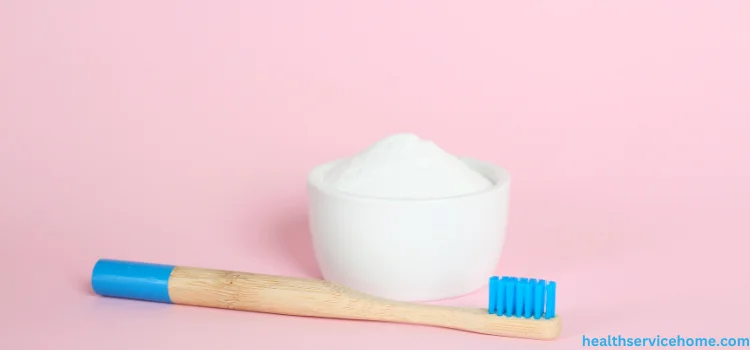
Despite the potential benefits of baking soda, it should not replace your daily toothpaste. Dentists typically advise against using baking soda alone due to its abrasiveness and lack of fluoride, which is crucial for preventing tooth decay and promoting tooth remineralization.
However, if you’re considering integrating baking soda into your oral care routine for its whitening effects, it’s recommended to do so sparingly. Many dental professionals suggest using it at most once or twice weekly.
Here’s a recommended method: Mix about a teaspoon of baking soda with a few drops of water to create a paste, then apply this mixture to your toothbrush and brush gently. Remember, brushing strokes should be gentle when using baking soda to avoid enamel erosion.
As with any change to your dental care routine, you should consult your dentist before brushing with baking soda. They can offer advice based on your specific oral health needs.
How To Whiten Teeth With Baking Soda And Peroxide?
Many people need clarification on baking soda with baking powder, but the two differ. Baking soda, sodium bicarbonate, has long been used as a natural teeth-whitening remedy. It creates an alkaline environment in your mouth, preventing bacteria from multiplying.
To whiten your teeth with baking soda and peroxide, you can make a paste by mixing one teaspoon of baking soda with two teaspoons of hydrogen peroxide.
Brush your teeth with this mixture weekly, and you’ll notice a brighter smile.
Baking Soda Or Baking Powder For Teeth.
Both baking soda and baking powder are leavening agents used in baking, but they are chemically different.
Baking powder contains baking soda but has an acidifying agent and starch. While baking soda is proven to have teeth-whitening properties, the same cannot be said for baking powder.
There isn’t enough research to support the effectiveness of baking powder in teeth whitening.
Baking Soda For Teeth And Gums.
Besides whitening your teeth, baking soda can also promote oral health. It can balance the pH levels in your mouth, combat bad breath, and help fight gum diseases like gingivitis due to its antimicrobial properties.
However, it’s essential to use baking soda sparingly and in conjunction with regular toothpaste, as it doesn’t contain fluoride, which helps to prevent tooth decay.
Is It Harmful To Brush Your Teeth With Baking Soda?
While baking soda can offer several oral health benefits, it’s crucial to use it correctly. Due to its abrasive nature, excessive or vigorous brushing with baking soda can wear away your tooth enamel.
It’s advisable to use baking soda for teeth whitening only a few times weekly and always brush gently.
Conclusion.
Regarding teeth whitening, it’s essential to separate fact from fiction. Baking powder, although similar in name and cooking function to baking soda, is not a proven method for teeth whitening.
The safer and more effective choice is baking soda, which has been shown to help whiten teeth by removing surface stains. However, even baking soda should be used sparingly and gently due to its abrasive nature.
Always remember that the best approach for teeth whitening is to consult a dental professional first.
Frequently Asked Questions.
How long does it take for baking powder to whiten teeth?
It can take weeks to months of consistent use to see noticeable results when whitening teeth with baking soda.
What is better for whitening teeth, baking soda or baking powder?
Baking soda is the better option for whitening teeth. While baking powder is excellent for baking, there’s not enough evidence to support its effectiveness in teeth whitening.
What can I mix with baking powder to whiten my teeth?
Mix baking soda with water to create a paste for teeth whitening. You can also mix baking soda with hydrogen peroxide for added whitening effect.
Can I use baking powder instead of baking soda?
You should not use baking powder instead of baking soda for teeth whitening. Baking powder’s chemical composition is different, and it doesn’t have the same teeth-whitening properties as baking soda.
Are baking soda and baking powder the same?
No, baking soda and baking powder are not the same. While both are used as leavening agents in baking, they have different chemical compositions. Baking powder contains baking soda, an acidifying agent, and starch, whereas baking soda is pure sodium bicarbonate.
Are baking powder and water suitable for teeth?
No substantial evidence suggests that a mixture of baking powder and water benefits teeth. While it may not harm your teeth, it’s unlikely to provide any significant benefits, including whitening. It’s better to stick to dentist-recommended toothpaste and mouthwash for oral health.
A Blogger, Author and Researcher! Gohar Aalam is recognized as a full-time blogger for Health and Tech Niches. I’m a Fountainhead of Healthservicehome.com, will provides high quality knowledge.
